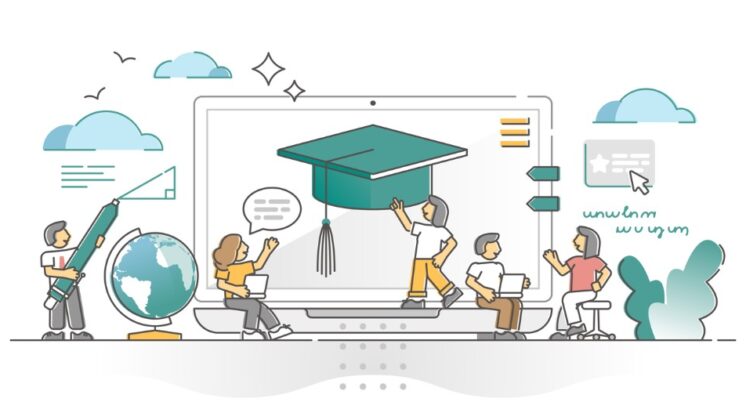Leading High Performing Remote Teams
How can leaders ensure that performance remains high in remote or hybrid-work environments?
Content Marketing
In this course, you’ll learn how compelling blogs, videos, podcasts, and other media can reach customers and drive sales. You’ll also learn steps for creating an effective content marketing plan, and some important ways to measure its impact and success.
Content marketing is a essential digital marketing strategy for companies looking to provide relevant and useful information to support your community and attract new customers.
Get started on your content marketing journey today.
Sustainable Innovation in Times of Disruption: Choices for a Better Society
There are opportunities for progress all around us. The key is to innovate on these opportunities sustainably.
To help identify most effective path forward, you'll need to gain a global perspective to these challenges in an open discussion. How can Japan and the world take action to create a more sustainable, innovative world? Where do you fit in?
It's time to find out.
Social Media & Digital Communications: Impact on Global Public Opinion
Social and digital media have dominated the communications industry for decades. But it's no secret that social media has the power to sway public opinion, and the way in which many companies use these platforms could be seen as manipulative.
What do companies need to be aware of when utilizing social and digital media? How can these mediums be used to better communicate strategically with the world?
Discover what top media and communications experts have to say.
CAGE Distance Framework
Want to expand overseas? The CAGE distance framework can help ensure you're constructing a solid global strategy in four areas: cultural, administrative, economic, and geographic. Learn how to leverage useful differences between countries, identify potential obstacles, and achieve global business success.
Servant Leadership
There's more to leadership than driving a team to profit. In fact, there's a word for looking beyond self-interest to prioritize individual growth: servant leadership. Try this course for a quick breakdown of what that is, how it works, and how it can lead to organizational success.
Strategy: Creating Value Inside Your Company
Have you ever wondered why certain companies are more successful than others? The answer is strategy: internal processes that control costs, allocate resources, and create value. This course from GLOBIS Unlimited can give you the tools you need for that strategic edge.
Strategy: Understanding the External Environment
To plan strategy on any level, you need to understand your company's external environment. In fact, your level of understanding can impact hiring, budgeting, marketing, or nearly any other part of the business world. Want to learn how to do all that? This course from GLOBIS Unlimited is the perfect first step!
Using Japanese Values to Thrive in Global Business
Japanese companies have unique cultural, communication, and operational challenges. But they also have values that have led to remarkable longevity. Check out this seminar to hear how these values help earn trust from overseas head offices and develop employees.
Marketing: Reaching Your Target
Every company works hard to get its products into the hands of customers. Are you doing everything you can to compete? In this course, you’ll find a winning formula to turn a product idea into real sales. Follow along through the fundamentals of the marketing mix and see how companies successfully bring products to market.
Basic Accounting: Financial Analysis
Want to compare your performance vs. a competitor? Or evaluate a potential vendor? Then you'll need to conduct a financial analysis. This course will teach you how to use three financial statements and evaluate financial performance in terms of profitability, efficiency, soundness, growth, and overall strength.
Career Anchors
What drives you to be good at your job?
Career anchors are based on your values, desires, motivations, and abilities. They are the immovable parts of your professional self-image that guide you throughout your career journey.
Try this short GLOBIS Unlimited course to identify which of the eight career anchors is yours!
Leadership with Passion through Kokorozashi
The key ingredient to success? Passion.
Finding your kokorozashi will unify your passions and skills to create positive change in society. This GLOBIS Unlimited course will help you develop the values and lifelong goals you need to become a strong, passion-driven leader.
Inspired by the dire state of climate change, entrepreneurs across the globe are taking a new approach to eco friendly business. And as they’re proving day after day, even during a pandemic, you can build a business that makes a profit, has scalability, and impacts the world for the better. You can embrace environmental sustainability as an asset.
But do you have to? Is a focus on environmental protection a nice consideration, or an indisputable focus?
We went to GLOBIS faculty to hear their thoughts.
Why should business students be focused on green energy and sustainable businesses?
Simply put, business students need to be thinking about sustainability because that’s what’s required in today business environment.
A business can be passive or proactive towards sustainability, but can’t skirt around sustainability. Governments are putting up stricter regulations and heftier fines, competition is touting its green programs, and consumers are demanding healthier and more environmentally friendly products.
Businesses should really take a proactive approach towards sustainability, even though it requires deeper thinking and more determination in execution. By putting real focus on sustainability, businesses can push for greater innovation, uncover new markets, lower operating costs, improve brand value and reputation, and create an uplifting working environment. Leaders don’t treat sustainability as a nice-to-have or an isolated corporate CSR effort—it’s an integral part of a company’s overall strategy.
Are you ready to lead?
―Dr. Alex Wang, Entrepreneurship Without Borders
Corporations can hardly survive without considering sustainability.
It is up to the sense of value of each student.
If the student believes that human sustainability is critical for their lives, they should just go for it. Business can be a great help for changing human behavior, as well as corporate behavior. Learning about business can accelerate a student’s social and economic impact, as well as environmental initiative.
Though it is a choice, if a student puts lower priority on sustainability, I would remind them that corporations can hardly survive without considering sustainability. Companies that harm human sustainability are penalized by the capital market, recruitment market, and business transaction market. For example, Apple Computer recently committed to becoming 100% carbon neutral in its supply chain by 2030. That means businesses in their supply chain that cannot achieve carbon neutrality will lose their contract with Apple.
We’ll see more and more of this in the future, so business students should definitely be thinking about it.
―Reiji Yamanaka, Venture Management
It has never been more important for leaders to nurture a lasting impact on our planet, communities, organizations, businesses, and homes. Over the last twenty years, the way we think about management has changed dramatically.
In the past, management was defined by competition. Winning that competition meant our life was enriched. It meant satisfaction, even self-realization. However, with climate change, we’ve entered an era in which the survival of humankind is in jeopardy as a direct result of our economic activities. The roles and responsibilities of management and leaders have inevitably changed.
Business students need to learn to lead in the new era. Doing business sustainably is how they will find happiness and satisfaction in their careers and lives.
―Satoshi Hirose, Entrepreneurial Leadership
Next Article
Your Morning Coffee Sustainability: An Alignment Chart
6 Ways to Measure Sustainability Value in Your Business
How to Transform Your Business with ESG Strategy
How can entrepreneurs make an environmental impact with their long term business model?
Build eco friendly strategies into your business from the start.
Make sure you build sustainability into a sustainable business model! I’ve seen too many entrepreneurs, especially social entrepreneurs, long on passion but short on making their own businesses sustainable.
The concept of triple bottom line (TBL)—profits, people, and planet—is not new, but it is incredibly hard to achieve. There are so many temptations and so much pressure that will draw entrepreneurs’ attention to financial gains, sometimes for very sensible reasons. Passionate entrepreneurs need to be steadfast to their original aspiration, let go of some near-term gains, and meet the seemingly insurmountable challenges along the way. That’s why it’s exceedingly important for entrepreneurs who want to build sustainability into their business model to walk the extra mile.
Make sure your startup venture itself is financially sound.
At the end of the day, your startup can make an impact on our society and the environment only if it stays alive (and hopefully achieves prosperity).
―Dr. Alex Wang, Entrepreneurship Without Borders–
Create a doushi platform.
My advice is to create a doushi platform.
Doushi (同志) is a Japanese word meaning “same mission.” For entrepreneurs to change the behavior of many citizens, they need to create a movement and involve millions of participants. For that purpose, it is critical to create some kind of platform that connects people with the same mission.
For example, mymizu has connected people who want to stop using plastic bottles. They did that by successfully building a network of restaurants that are willing to serve free water, even to non-customers. Pirika, too, created a community app on which members applaud each other when they pick up litter on the street, beach, etc. Mosaic created a peer-to-peer lending platform that encourages homeowners to install solar panels on their roofs.
Each of these entrepreneurs built doushi platforms and facilitated interaction in the network. This approach accelerates both a business transaction and social change.
―Reiji Yamanaka, Venture Management–
Consider needs, strengths, and speed.
First, determine what your customers are struggling with. What do they need, or what will they need in the future? Think about the customer’s perspective and how to solve their troubles.
Next, consider what you can do that no one else can. The internet has helped spread information faster than ever before—all of the obvious solutions are already underway. Future entrepreneurs need to think deeper and come up with ideas no one else has thought of yet.
Lastly, get your business started as soon as possible. The faster you move, the faster you can fail—and the faster you can fix what doesn’t work. That will help you gain experience quickly. With so many competitors, experience is very important.
Tomorrow’s entrepreneurs will face unique challenges, but they also have so much potential. I can’t wait to see what they come up with.






